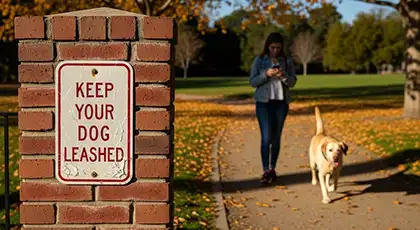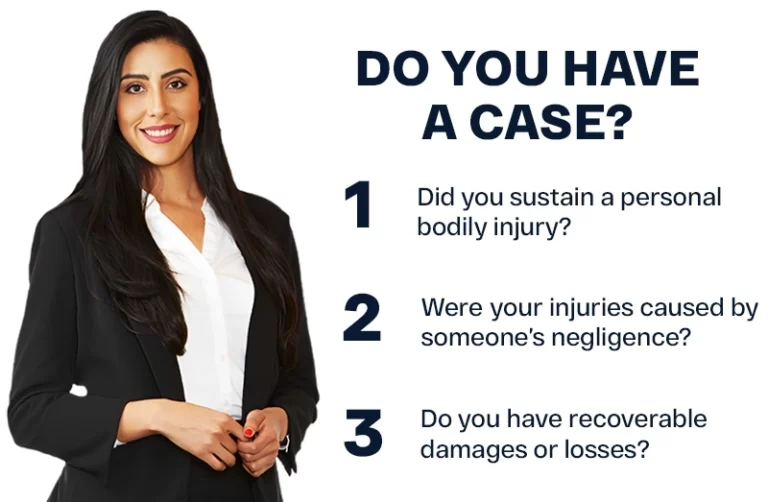TL;DR: While national bite data rarely isolates dog parks, studies show that 6.3% of all reported dog bites occur in parks and recreational settings. With over 4.5 million dog bites annually in the U.S., that suggests over 283,000 bites could occur in outdoor parks each year, including dog parks.
Table of Contents
Dog parks offer a fun, safe space where you and your pet can play, walk, and socialize. Yet sometimes, things go wrong. A relaxed outing can quickly turn serious if a dog becomes aggressive and bites someone. One study found that 6.3% of reported dog bites happened in parks.
While it didn’t focus on dog parks specifically, it shows that outdoor recreational areas carry real risks. If a dog bit you or a family member, our dog bite lawyers will help you explore your legal options. Call (888) 488-1391 to speak with our team.
While there’s limited data on bite incidents specifically at dog parks, dog bites in general are a growing concern. The American Veterinary Medical Association reports that around 4.5 million people are bitten by dogs in the U.S. each year. As more communities build dog parks, the chance of bites during dog-to-dog or dog-to-human interactions may increase.
Dog Parks And Dog Bites: Is There A Link?
On the surface, more dog parks might seem like a way to reduce dog bites. Regular exercise and socialization can help dogs release energy, lower stress, and improve behavior. When owners follow park rules and supervise their pets closely, the environment can stay positive.
However, more parks also mean more interactions between unfamiliar dogs and people. These encounters can lead to conflict, especially when pets are not well-socialized or when handlers are distracted. Some dog owners may feel too comfortable and ignore early signs of stress or aggression.
Assuming every dog park is safe can be a dangerous mindset. A relaxed atmosphere does not remove the need for caution. Understanding how problems arise is one of the best ways to prevent bite incidents and protect everyone at the park.
Which Cities See The Most Dog Bites?
Dog bites aren’t evenly distributed across the United States. According to the most recent data from the U.S. Postal Service, certain cities experience significantly higher rates of dog attacks on postal workers, which serves as a reliable indicator of overall dog bite incidents in communities.
Top 5 California Cities For Dog Bites According To Official 2023 USPS Data
Based on the latest U.S. Postal Service National Dog Bite Rankings released in May 2024:
- Los Angeles – 65 incidents
- San Diego – 41 incidents
- Sacramento – 26 incidents
- San Francisco – 20 incidents
- Long Beach – 19 incidents
Top U.S. Cities For Dog Bites According To Official 2023 USPS Data
- Los Angeles, CA – 65 incidents
- Houston, TX – 56 incidents
- Chicago, IL – 48 incidents
- St. Louis, MO – 46 incidents
- Cleveland, OH – 44 incidents
- San Diego, CA – 41 incidents
- Dallas, TX – 39 incidents
- Cincinnati, OH – 38 incidents
- Philadelphia, PA – 34 incidents
- Columbus, OH – 33 incidents
Key Statistics
- Total 2023 Incidents: More than 5,800 dog attacks on postal workers nationwide
- California Leads All States: 727 total incidents in 2023
- Texas Ranks Second: 411 total incidents in 2023
- Ohio Ranks Third: 359 total incidents in 2023
Why These Numbers Matter: The U.S. Postal Service tracks dog bite incidents because mail carriers visit virtually every address in America daily, making their data one of the most comprehensive measures of dog aggression by location. These statistics help identify areas where dog bite prevention education and enforcement are most needed.
Official Source: U.S. Postal Service National Dog Bite Rankings
Do More Dog Parks Mean More Dog Bites?
Dog parks have grown in popularity, but does that mean more bite incidents? Here’s what the numbers show:
- Growth in Dog Parks:
- Public dog parks in the U.S. increased by 40% between 2009 and 2017.
- Boise, Idaho, had 15 dog parks in 2018 for a population of over 200,000. That equals about 6.7 parks for every 100,000 residents.
- San Francisco had 32 dog parks for around 870,000 people. That comes out to about 3.7 parks for every 100,000 residents.
- Oakland had 16 dog parks for about 420,000 residents. This results in about 3.8 parks for every 100,000 residents.
- Dog Bite Emergency Room Visits:
- Idaho (2023) — 1,608 ER visits caused by dog bites.
- California (2022) — 48,596 ER visits related to dog bites.
At first glance, it might seem like California has a much bigger problem. However, the numbers reflect different reporting years, and the two states have different populations. California has over 39 million people, while Idaho has around 2 million. Other important factors include how many people own dogs and how each state manages its dog parks.
Researchers need to study this further to understand whether more dog parks increase bite risks or help reduce them through better dog socialization and exercise.
How Do Bite Incidents Happen At Dog Parks?
Dog bites at parks can happen for many reasons, especially when owners or dogs are unprepared. Here are some of the most common causes:
- Lack of Control — Bites often happen when a dog is off-leash, and the owner cannot manage its behavior.
- Overcrowding — A high number of dogs in one area can overwhelm them. Stress and overstimulation may cause even calm dogs to react aggressively.
- Poor Supervision — Distracted owners might miss early signs of tension or aggression between dogs.
- Conflicting Social Styles — Not all dogs are social in the same way. Some dogs may feel threatened or annoyed by overly playful or unfamiliar dogs.
- Unfamiliar Environment — A dog not used to dog parks may feel anxious or territorial, increasing the risk of defensive behavior.
Dog parks don’t guarantee positive encounters. Even well-socialized dogs can react unpredictably in certain situations.
Understanding how and why bites happen at dog parks can help you stay alert and know when to take action. If you’ve been bitten, a dog bite lawyer can help you understand your rights and seek compensation for your injuries.
Common Reasons Dogs Bite At Parks
Recognizing why dogs bite can help you understand what led to the attack and how to respond. These are some of the most common reasons dogs become aggressive at parks:
- Fear or Anxiety — A dog might bite if it feels cornered, threatened, or overwhelmed by noise and activity.
- Lack of Socialization — Dogs that haven’t learned how to interact with others may misread cues and respond aggressively.
- Territorial Behavior — Some dogs see park areas as their space and may bite to defend it from people or other dogs.
- Defensive Reactions — If a dog feels chased or harassed, even by a playful dog or a stranger, it may bite to protect itself.
- Protective Instincts — A dog might misinterpret someone approaching its owner as a threat and act aggressively.
- Overstimulation — Too much excitement, fast movement, or barking can cause dogs to lose control and nip or bite.
- Injuries or Illness — A dog in pain or unwell may lash out unexpectedly.
- Rough Play — Some dogs don’t know the limits of safe play. Without clear training, they might bite as part of what they think is a game.
Each of these factors may contribute to a serious injury. If you or a loved one was hurt in a dog park, our dog bite lawyers can help you understand your rights and legal options.
Laws That May Apply To Bite Incidents In Dog Parks
Dog parks are meant to be safe, welcoming spaces for people and their pets. However, when unexpected incidents happen, the law establishes a process to hold the appropriate party accountable. California has clear rules that protect people while recognizing the responsibility of dog ownership.
Strict Liability Rule
In California, dog owners are generally responsible if their dog bites someone. You don’t have to prove the owner knew the dog was dangerous. To make a valid claim, you must show:
- The person being held responsible owns the dog.
- The bite happened in a public place or on private property where you had permission to be.
- You were not trespassing.
- The bite caused an injury.
There are some cases where the rule may not apply:
- Trespassing — If someone enters a private or restricted dog park without permission, the owner might not be fully liable.
- Provocation — If the person bitten was behaving aggressively toward the dog, that may affect liability. However, not all interactions count as provocation under the law.
Working with dog bite lawyers can help you understand how the law applies to your situation and guide you through your options.
Leash Law And Dog Park Rules
Dog parks often have specific guidelines to keep pets and people safe. These rules vary depending on the city or county, so it’s important to be familiar with the local policies in your area. In most California communities, leash laws require owners to keep their dogs on a leash in public spaces, except in designated off-leash zones like dog parks.
Here are some common rules in California dog parks:
- Off-Leash Areas — Some parks allow dogs to be off-leash only in specific zones. In Sacramento, for instance, off-leash access is limited to marked sections.
- Dog Limits — Many parks restrict how many dogs one person can supervise. In Danville, handlers are limited to three dogs at a time.
- Vocal Control Requirement — Even in off-leash areas, owners must be able to control their dogs using verbal commands.
- Behavior Standards — Parks may ban dogs that act aggressively. In Calabasas, any dog showing threatening behavior must be leashed or removed from the park.
Following leash laws and park-specific rules helps prevent accidents and supports safe, respectful interactions in shared public spaces. When an owner fails to follow these rules and someone gets hurt, they may be held responsible under California’s strict liability law.
Dog bite lawyers can evaluate the evidence and identify potentially liable parties, and guide you through the legal process. Understanding how these rules apply gives you a clearer view of your legal options after an injury at a dog park.
Frequently Asked Questions About Bite Incidents In Dog Parks
Dog bite incidents in public parks can be confusing and stressful. Our dog bite attorneys understand these challenges and offer comprehensive legal support to help you navigate this situation. Below are answers to common questions about legal rights, responsibilities, and what to expect after a dog bite. For personalized guidance, call us at (888) 488-1391.
What Is The Deadline For Filing Dog Bite Lawsuits?
In California, you generally have two years from the date of the injury to file a personal injury claim related to a dog bite. Acting within this time frame, referred to as the “statute of limitations,” is important, especially while the evidence is fresh.
There are exceptions to this rule:
- If the victim is a minor, the two-year period starts when they turn 18. However, a parent or guardian can file a claim on their behalf before then.
- If the victim is mentally incapacitated, the clock may pause until they regain legal capacity. A legally appointed representative, such as a parent or guardian, can act on their behalf in the meantime.
Filing a lawsuit is just one option. In some cases, filing a claim with the dog owner’s insurance company may lead to a faster and more practical resolution. A dog bite lawyer can guide you through the legal system and help you understand your rights.
Do I Need A Personal Injury Lawyer After A Bite Incident At A Dog Park?
You can handle a claim independently, but having an injury attorney can be helpful. California law holds owners responsible for their animals’ actions even in shared public spaces like dog parks.
Serious injuries like deep wounds, torn tendons, or broken bones often lead to steep medical costs. Insurance companies may try to downplay the incident or argue you accepted the risk by entering the park. A lawyer can help by:
- Gathering key evidence such as witness statements, park footage, and medical records.
- Dealing with the insurance company on your behalf.
- Helping you pursue compensation for your injury-related expenses.
Even in an off-leash area, strict liability laws still apply. A skilled injury lawyer can uncover key details.
Are Dog Park Owners Liable For Dog Bites?
People hurt in a dog park may wonder if they can sue the city’s parks and recreation department. Signs that say “use at your own risk” might reduce the city’s responsibility, but they don’t offer complete protection.
Cities are usually not liable for common risks in public dog parks. However, if a dangerous condition caused the incident, such as a broken fence or faulty gate that let a stray dog in, and the city knew about it but failed to fix it, the agency could still be held responsible.
The same applies to private dog parks in apartments or residential communities. While the dog’s owner is typically responsible for medical costs, property managers may also be liable if poor maintenance or negligence contributed to the incident.
A dog bite attorney can help you assess the merits of a potential claim. Fill out our “Do I Have A Case?” form to schedule a free initial consultation. Our dog bite lawyers will review your situation and provide guidance on your next steps.
Why Is It Risky To Be Bitten By A Dog At A Dog Park?
Getting bitten at a dog park carries added risks because you may not know the health or history of the animal involved. Many owners bring their pets to these parks, and not all of them keep vaccinations or licenses up to date. While some cities, like Long Beach, require proof of vaccinations and registration, enforcement can vary depending on the park.
Vaccinations are important because they help prevent infections that can be spread through bites, such as rabies, tetanus, or Pasteurella. If a dog has not been vaccinated, the risk of serious disease is much higher for the person bitten.
Dog bite attorneys can help by reviewing veterinary records to check the dog’s vaccination history and confirm who owns the pet. These details are key when addressing health concerns and navigating the legal process for accountability.
What Damages Can You Pursue After A Dog Bite?
Getting bitten at a dog park can leave you with more than just physical pain. Emergency bills are only the beginning. Some injuries, like facial wounds or nerve damage, may require surgery, therapy, or long-term care. Others may need mental health counseling to cope with the trauma.
Some people cannot return to work right away, especially if the injury affects a hand, arm, or other critical area. In more serious cases, permanent disabilities can reduce future earning capacity. California law allows you to seek compensation for these hidden costs, not just the immediate medical bills.
Here are some damages you may seek in a personal injury claim:
- Economic Damages — These are measurable losses backed by records like bills or pay stubs:
- Medical expenses for hospital care, surgeries, prescriptions, and follow-up treatment. This also includes future costs for therapy or vaccinations. If you suffered injuries like head trauma, spinal cord damage, or joint sprains, recovery may require physical therapy or chiropractic care.
- Lost income if your injuries forced you to miss work. If the bite affected your ability to work, you may also seek compensation for lost future earnings.
- Long-term care costs, such as mobility aids, in-home assistance, or counseling to treat the mental toll of the attack.
- Non-Economic Damages — The emotional and psychological effects of a dog bite that, while not tied to a dollar amount, still matter. These include:
- Pain and suffering
- Psychological trauma
- Emotional distress
- Loss of enjoyment of life
According to the Centers for Disease Control and Prevention (CDC), 468 people in the U.S. died from dog bite injuries between 2011 and 2021. In fatal cases, surviving family members may be eligible to file a wrongful death claim. This may include costs for funeral arrangements and the loss of financial support.
What Can I Do To Protect My Claim After A Bite Incident At A Dog Park?
If you’ve already been treated for a bite at a dog park, there are still helpful steps you can take to protect your legal rights and support your claim:
- Stick to Your Medical Plan — Your doctor may suggest a tetanus shot, stitches, or antibiotics. Follow all instructions and keep detailed records of medical visits, prescriptions, and follow-up care.
- Write Down the Details — As soon as possible, jot down every detail you remember. Include the time, location, what led up to the bite, how the other dog behaved, and anything the owner said or did.
- Collect and Organize Evidence — Store photos of your injuries and the scene, especially if you took them right after the incident. Keep all paperwork related to your medical care and communications.
- Reach Out to Witnesses — If anyone saw what happened, get their contact details. Witness statements can support your version of events.
- Be Careful With Insurance Calls — If the dog owner’s insurance company contacts you, do not agree to a recorded statement or accept any settlement without understanding your options.
- Consult a Dog Bite Lawyer — Dog bite attorneys can help investigate the incident to identify potentially responsible parties, including whether park rules or leash laws were ignored. They also assist with insurance claims and help calculate damages for your medical bills, lost income, and pain.
Even if some time has passed since the incident, these steps can have an impact on your case.
Let Our Lawyers Help You With Your Dog Bite Case
Dog parks are meant to be safe, open spaces for the community. When a bite happens, it can lead to lasting physical, emotional, and financial harm. Legal support is available for those dealing with the consequences of a dog bite.
California law protects everyone injured by a dog bite, regardless of immigration status, employment situation, language ability, or housing status. Whether you are undocumented, unemployed, or unhoused, your legal right to seek compensation is protected under state law.
Our dog bite lawyers are here to help. We can investigate the incident, gather evidence, handle the insurance claims, and advocate on your behalf for the compensation available under the law. From medical expenses and lost income to emotional distress, we help you seek compensation based on the facts of your case.
Aside from dog bites, our personal injury and car accident lawyers can handle various types of cases. We offer a free and confidential initial consultation to discuss your situation. Our legal services are offered on a contingency basis, meaning attorney’s fees are only collected if compensation is successfully recovered on your behalf. This payment arrangement will be discussed during our meeting. Call us at (888) 488-1391 or fill out our online form to get started.













